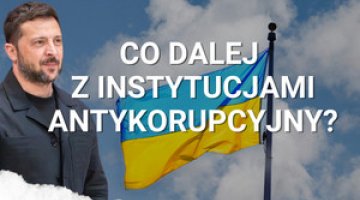Ukraine’s Constitutional Court reinstates presidential system
On 1 October, the Ukrainian Constitutional Court repealed a law of 8 December 2004 which introduced a constitutional amendment changing the system of government from a presidential-parliamentary to a parliamentary-presidential one. The Court decreed that it had been introduced in violation of the constitution. In connection with this, the Court adjudicated that as of the moment of this ruling, the version of the constitution from 1996 was once again valid. There is no doubt that the Constitutional Court’s ruling was made in the interest of (if not under pressure from) President Viktor Yanukovych. The ruling restores the president’s superiority in the political system, as it weakens the government and parliament alike. Such a monopolisation of power, especially in the current political climate, may favour tendencies to limit democratic mechanisms in Ukraine.
The legal aspect of the Court’s decision
The Constitutional Court’s adjudication, confirming the illegality of the 2004 amendment, is valid. It is beyond doubt that during the revision of the constitution in December 2004, its precepts were violated. The binding procedures for introducing changes to the basic law were clearly violated at that time.
The Constitutional Court adjudicated that the amendment expires as of the day of the adjudication; so, from 1 October, constitution in its 1996 form will apply once again. At the same time, the Court demanded of the state organs that they bring the legal acts which they issued into conformity with the previous version of the constitution, implying that the legal acts and other decisions taken before 1 October 2010 on the basis of the 2004 constitution retain their validity. In this way the continuity of the state institutions will be maintained.
Whether the Constitutional Court was competent to command the state organs (including parliament) to do these things, and also whether it was competent to state that annulling this amendment means a return to the powers of the constitution as delineated before the amendment, is open to question. If, however, the Court evades taking a position in this matter, this would lead to a situation in which it would not be clear what legal consequences its declaration would have.
It cannot be said that the Constitutional Court’s decision was taken independently. It was most likely made under pressure from the head of state and the ruling party. According to information from the most important opinion-forming periodical, the weekly Zierkalo Niedieli, the text of the adjudication itself was devised by lawyers from the President’s Administration, not the judges of the Constitutional Court. This information cannot be verified, although the Court’s limited independence is not in doubt. Of course, this does not disprove the legal validity of the adjudication (the decisions of the Court are final), and has no influence on whether it is legitimate.
The genesis of the problem
The Constitution of Ukraine, as approved in 1996, ensured the dominance of the president in the political system. Towards the end of President Leonid Kuchma’s second term, work was undertaken on updating it, with the intention of significantly limiting the power of the head of state. In 2004, these changes were approved on first reading, and positively assessed by the Constitutional Court; however, they could not have been approved on second reading, as the president’s supporters did not have a qualified majority in parliament.
During negotiations intended to solve a crisis after the falsified presidential elections in November 2004, the amendment to the constitution became one of the elements of compromise. The aim of Kuchma and his entourage was to weaken the new president. During the work on this matter, several mistakes were made, which laid the basis for an appeal to the Constitutional Court against the amendment. However, the amendment was approved on 8 December 2004 by the votes of all parties (including the Party of Regions), with the exception of the Yulia Tymoshenko Bloc.
The amendment, which was burdened by numerous faults and errors, fundamentally deregulated the co-operation of the central state organs, and the difficulties which beset Ukraine in the period from 2005 to 2009 derived to a great extent from these dysfunctional constitutional measures. The situation was worsened by the fact that a considerable number of the relevant legal acts were not harmonised with the altered provisions of the constitution.
In 2007, deputies linked to the then President Viktor Yushchenko appealed against the amendment, however in February 2008, the Constitutional Court evaded considering the matter, on the pretext that when the amended constitution came into force, the law on the amendment ‘expired’, and its legality could not be reconsidered. This was a classic legal evasion. This decision also was not taken independently, and its cause must be sought in the influence of the then Prime Minister Yulia Tymoshenko (who at that time opposed strengthening the power of the president), which prevailed over that of Yushchenko.
For several years, the Party of Regions had stated the necessity of a return to the presidential-parliamentary system, and in the presidential campaign of 2010 it announced the reinstatement of the basic law in its 1996 version. In July 2010, a constitutional complaint was submitted; soon afterwards, for unclear reasons (perhaps under pressure), three judges (out of a total of 18) who were seen as close to Yushchenko resigned from the Constitutional Court.
Political consequences of repealing the 2004 amendment
The reinstatement of the 1996 constitution definitely strengthens the president as the head of the executive; in addition, parliament’s influence on government has been severely curtailed. The Prime Minister, who can be dismissed by the president without consulting parliament, has lost his independent position, thus becoming the de facto ‘first minister of the president’. There will also be a concomitant growth in the importance of the President’s Administration and its head, who can attempt to win the position of ‘super-premier’ (which happened on several occasions during the presidency of Leonid Kuchma).
Under the rule of the 1996 constitution, there is no obligation to create a majority coalition in parliament, and deputies may freely change their factional allegiance and create new factions during the parliamentary term. The Party of Regions will exploit these new options with the aim of further weakening the opposition. It must be expected that most of the current non-factional deputies will enter one of the ruling coalition’s factions, and also that more deputies from the opposition parties of the Tymoshenko Bloc and Our Ukraine will also join them.
The reinstatement of the 1996 constitution will return coherence and the ability to function correctly to the central organs of the Ukrainian state. However, in the current conditions, the clear predominance of the president poses a threat to Ukrainian democracy. The temptation to expand further in the direction of ‘soft’ authoritarianism will be great, especially as never before in the history of independent Ukraine has the ruling camp enjoyed such a definite superiority of power over the opposition.
How the situation may develop
The reinstatement of the constitution in its 1996 version would cause numerous legal conflicts and ambiguities. The most urgent task is to settle the matter of the length of the parliamentary term; if it is decided that the current term will be shortened to four years (in accordance with the 1996 constitution), then parliamentary elections must be held next spring. The Party of Regions has thus decided it will urgently table an amendment to the constitution extending the parliamentary term to five years. The elections will thus take place according to the originally planned schedule, in the autumn of 2012. The most important laws which must be adapted to the new legal situation will quite quickly be amended also, principally the law on government and the regulation of parliament (plans for these amendments, which were clearly prepared in advance, are already before parliament). Next in line will be work on fundamental amendments to the constitution, or even devising an entirely new basic law, which could come into force after the parliamentary elections.
One of the most serious political consequences of the reinstatement of the 1996 constitution is the growth in importance of the President’s Administration and its head in the system of the state organs. This is more dangerous, as the President’s Administration is an extra-constitutional body, and its activities are regulated solely by decrees of the president. At its head today stands Serhiy Lovochkin, the leader of one of the main factions within the Party of Regions (the RosUkrEnergo group); the competing Donetsk faction is weakly represented in the Administration, but more strongly in the government, in the persons of the deputy PMs Borys Kolesnikov and Andriy Kluyev. It may be feared that Lovochkin will aim to monopolise influence on the president, which would limit the head of state’s real power to the advantage of the head of his own Administration. More importantly, the main disputes in Ukrainian political life would move from parliament to the corridors of the Presidential Administration.
Appendix
Main changes resulting from the restoration of the 1996 constitution
President
Until now,
he presented to parliament the candidate for prime minister, as recommended by a parliamentary majority;
presented to parliament the candidates for the foreign and defence ministers;
reported to parliament on the appointment and dismissal of the head of the Security Service of Ukraine (SBU);
suspended the power of acts of government if they contradicted the constitution, at the same time sending them for consideration by the Constitutional Court.
Currently,
he presents to parliament the candidate for prime minister;
can dismiss the prime minister without consulting parliament;
appoints (at the notice of prime minister) to their posts the ministers and the heads of other central organs of executive power, including the head of the Security Service of Ukraine;
appoints and dismisses the heads of the Anti-Monopoly Commission, the State Property Fund and the State Committee for Radio and Television (with the consent of parliament);
creates and abolishes ministries and other central organs of executive power;
repeals legal acts of government.
Government
Until now,
it created and abolished ministries and other central organs of executive power;
appointed the heads of other central organs of executive power;
presented to parliament the notices of appointment and dismissal of the heads of the Anti-Monopoly Commission, the State Property Fund, the State Committee for Radio and Television, and a range of other posts.
Currently,
it has lost all of the above-mentioned functions.
Parliament (Verkhovna Rada)
Until now,
it created a majority coalition, which announced a candidate for prime minister to the president;
appointed (at the notice of the president or prime minister) the prime minister, members of the government, the heads of the Security Service of Ukraine, the State Property Fund and the State Committee for Radio and Television; passed no-confidence votes in members of government, and dismissed other officials upon the appropriate notice;
it could be dissolved ahead of electoral schedule in the following cases: 1) if a coalition is not assembled within one month; 2) if a government is not formed within two months of the dismissal of the previous one; 3) no plenary sessions are undertaken within 30 days of session.
Currently,
it votes on the candidacy of a prime minister as submitted by the president;
passes no-confidence votes in members of the government;
can be dissolved ahead of electoral schedule if no plenary sessions are undertaken within 30 days of session.
Deputies
Until now,
they had to join party factions, from which lists they were chosen, and could not leave until the end of the parliamentary term, on pain of losing their seat (they retained their seat only if they were excluded from their faction).
Currently,
they can freely change their factional adherence during the parliamentary term, and can also create new factions.
The Chairman of Parliament
Until now,
he performed the functions of the president if the latter post was vacant;
independently signed and published laws which the president did not want to sign even if his veto were overturned.
Currently,
he has lost these rights (to the prime minister).





